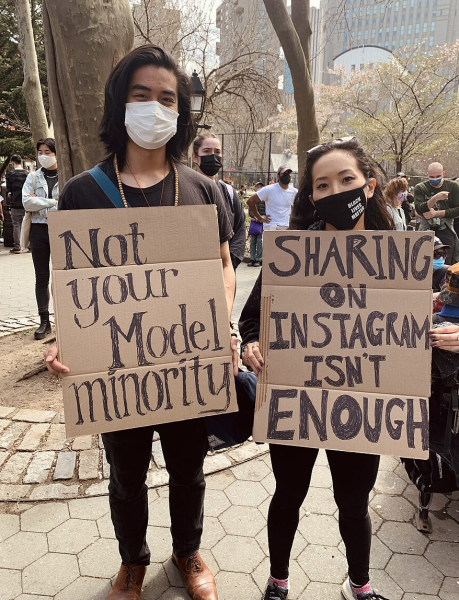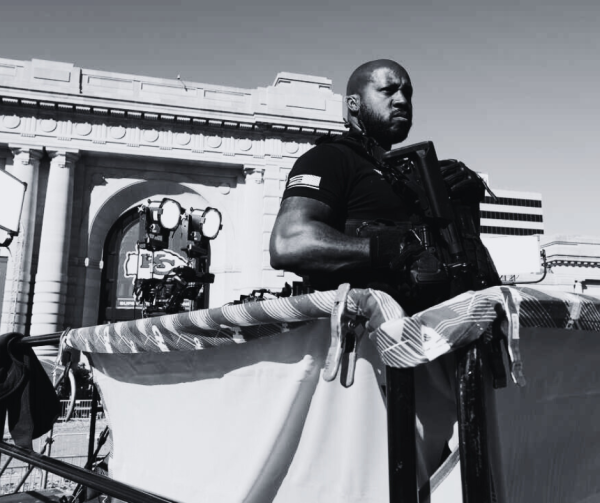The Haitian immigration crisis: an American problem
If America wants to blame anyone for the crisis of Haitian immigrants at the border, it should look within
Thousands of Haitian immigrants at the Texas border in September
November 16, 2021
In the last year, the Immigration and Customs Enforcement Agency has come under fire for how it has handled the ongoing Haitian refugee crisis. The flux of immigrants can be attributed to the economic and political tragedies that have plagued Haitian history. Most of the blame for these disasters often falls on large European countries like France. This is fair; in 1825, after the Haitian slave rebellion, French colonizers demanded reparations from Haiti to repay them for their “lost property”, a debt that took nearly 130 years to pay off. Many are unaware of the role of America in the economic turmoil of Haiti and opine that America has no obligation to provide shelter for Haitian refugees. But overlooking America’s involvement in tragedies that have become commonplace in Haitian history is all too naive.
For centuries, the United States has been involved in concentrated efforts to kneecap and cripple Black countries, and Haiti is no exception. During the Haitian Slave Revolt, President Thomas Jefferson lent France arms and supplies to suppress the slave rebellion as he was a slave owner. After the Haitian Slave Revolt succeeded, the US government refused to acknowledge Haiti as an independent nation until 1862, for fear that a successful slave rebellion in North America would inspire slaves in the US to do the same. In 1868, President Andrew Johnson supported efforts to forcefully annex Hispaniola in an attempt to gain power over European powers in the Caribbean. The US marines took control of Haitian banks and held $500,000 (roughly $13,000,000 today) in cash in New York City, essentially giving the United States control over Haiti’s banks, and eventually control of the entire country.
From 1915 to 1934, the US Marines occupied Haiti under the guise of protecting the country from foreign influences. However, America would soon demonstrate that they were more of a threat to Haiti than any other nation at the time. During the US occupation of Haiti, the US influenced Haiti to rewrite a provision in its constitution that prevented people from owning land or companies in Haiti without being a resident, a change that several American corporations took advantage of. This was only the first of many decisions made by the US to exploit Haiti for economic gain.
During the occupation of Haiti, US legislators pressured Haitian leaders into electing Philippe Sudré Dartiguenave into the office of president, as he was notoriously pro-American in his policies. On December 6, 1929, a group of US Marines fired at a group of fifteen hundred protesters, killing 12 people. Even US military officials think unfavorably of their actions in Haiti, such as former Marine general Smedley Butler, who said: “During [the US occupation of Haiti], I spent most of my time being a high-class muscle-man for Big Business, for Wall Street and for the Bankers. In short, I was a racketeer, a gangster for capitalism.”
After being forced out of Haiti in 1934, the US military mostly stayed out of Haitian foreign affairs. That is, until 1991, when President George H.W. Bush suspended all aid from America to Haiti, except for humanitarian assistance. At this point, Haiti was still dependent on the US for most resources as a result of their nearly 2-decade-long military occupation of the country; Haiti depended on America for 85 percent of its exported goods. The US continued its attempts to keep Haiti in a destitute position when in 2011 it was revealed that President Barack Obama attempted to keep the Haitian minimum wage at 31 cents an hour, instead of the proposed 62 cents per hour.
America is directly responsible for many of the hardships that drove Haiti to such a desolate position in the first place.
Some may wonder how any of this connects America to the current Haitian immigration crisis. The answer is quite simple: America is directly responsible for many of the hardships that drove Haiti to such a desolate position in the first place. Many Haitians cite the assassination of Haitian president Jovenel Moise earlier this year, and the magnitude 7.2 earthquake that hit the country less than four months ago as major reasons for their departure from the country. The assassination of Moise could have been prevented if the US hadn’t left Haiti in a state of political turmoil. Moise was such a controversial figure because of the allegations of election fraud surrounding his 2015 campaign. If the US hadn’t set the precedent that Haitian elections can be easily interfered with by forcing the election of Philippe Sudré Dartiguenave, Moise might not have been such a polarizing leader and the assassination could have been avoided.
Alaska alone has had 15 earthquakes at a higher magnitude than the one that impacted Haiti but was never in such a state of economic despair because the US has been in a state of dependence to an imperialist power since the original 13 colonies. America cannot be completely absolved of responsibility for the current state of Haiti, and thus their unreasonably harsh treatment of refugees at the border is unacceptable. More refugees have been deported from the border this year alone than any other year since 2000. The former US special envoy to Haiti, Daniel Foote, resigned this year, citing the deportation of Haitian immigrants as his reason for resigning, calling the treatment of Haitian refugees “inhumane and counterproductive” and lambasted the US approach to foreign relations with Haiti as being “deeply flawed.”
America’s brutal treatment of Haiti and its people has gone ignored far too long, and if America truly wants to take steps toward racial equality, it must rectify the damage they’ve caused to people of color overseas in countries like Haiti.













Taylor Canty • Nov 19, 2021 at 5:28 pm
Well written article!